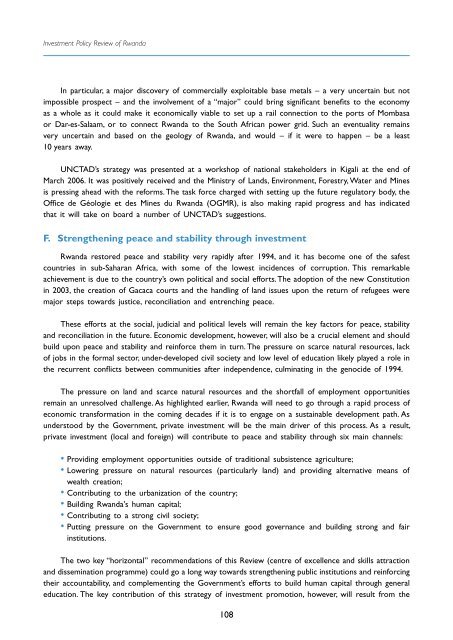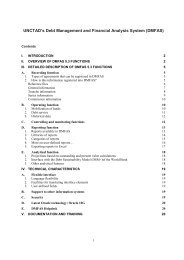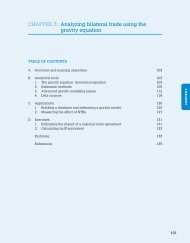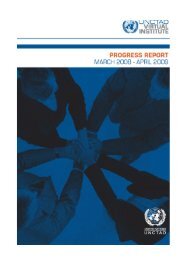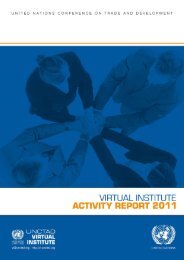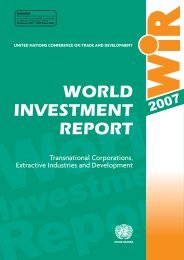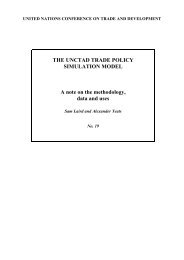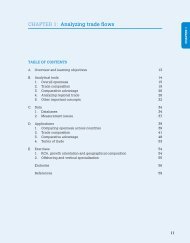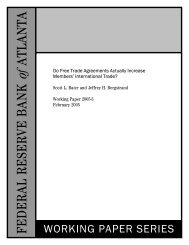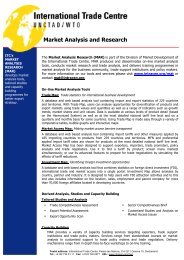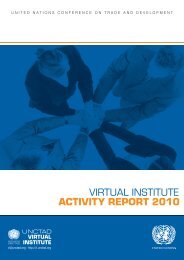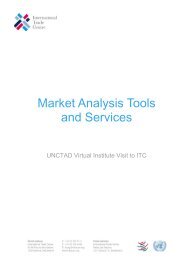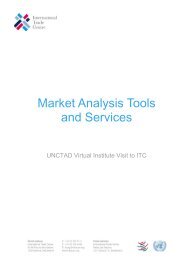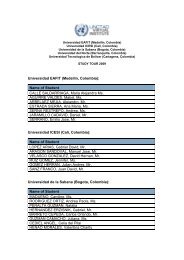Investment Policy Review - Rwanda - UNCTAD Virtual Institute
Investment Policy Review - Rwanda - UNCTAD Virtual Institute
Investment Policy Review - Rwanda - UNCTAD Virtual Institute
Create successful ePaper yourself
Turn your PDF publications into a flip-book with our unique Google optimized e-Paper software.
<strong>Investment</strong> <strong>Policy</strong> <strong>Review</strong> of <strong>Rwanda</strong><br />
In particular, a major discovery of commercially exploitable base metals – a very uncertain but not<br />
impossible prospect – and the involvement of a “major” could bring significant benefits to the economy<br />
as a whole as it could make it economically viable to set up a rail connection to the ports of Mombasa<br />
or Dar-es-Salaam, or to connect <strong>Rwanda</strong> to the South African power grid. Such an eventuality remains<br />
very uncertain and based on the geology of <strong>Rwanda</strong>, and would – if it were to happen – be a least<br />
10 years away.<br />
<strong>UNCTAD</strong>’s strategy was presented at a workshop of national stakeholders in Kigali at the end of<br />
March 2006. It was positively received and the Ministry of Lands, Environment, Forestry, Water and Mines<br />
is pressing ahead with the reforms. The task force charged with setting up the future regulatory body, the<br />
Office de Géologie et des Mines du <strong>Rwanda</strong> (OGMR), is also making rapid progress and has indicated<br />
that it will take on board a number of <strong>UNCTAD</strong>’s suggestions.<br />
F. Strengthening peace and stability through investment<br />
<strong>Rwanda</strong> restored peace and stability very rapidly after 1994, and it has become one of the safest<br />
countries in sub-Saharan Africa, with some of the lowest incidences of corruption. This remarkable<br />
achievement is due to the country’s own political and social efforts. The adoption of the new Constitution<br />
in 2003, the creation of Gacaca courts and the handling of land issues upon the return of refugees were<br />
major steps towards justice, reconciliation and entrenching peace.<br />
These efforts at the social, judicial and political levels will remain the key factors for peace, stability<br />
and reconciliation in the future. Economic development, however, will also be a crucial element and should<br />
build upon peace and stability and reinforce them in turn. The pressure on scarce natural resources, lack<br />
of jobs in the formal sector, under-developed civil society and low level of education likely played a role in<br />
the recurrent conflicts between communities after independence, culminating in the genocide of 1994.<br />
The pressure on land and scarce natural resources and the shortfall of employment opportunities<br />
remain an unresolved challenge. As highlighted earlier, <strong>Rwanda</strong> will need to go through a rapid process of<br />
economic transformation in the coming decades if it is to engage on a sustainable development path. As<br />
understood by the Government, private investment will be the main driver of this process. As a result,<br />
private investment (local and foreign) will contribute to peace and stability through six main channels:<br />
•<br />
•<br />
•<br />
•<br />
•<br />
•<br />
Providing employment opportunities outside of traditional subsistence agriculture;<br />
Lowering pressure on natural resources (particularly land) and providing alternative means of<br />
wealth creation;<br />
Contributing to the urbanization of the country;<br />
Building <strong>Rwanda</strong>'s human capital;<br />
Contributing to a strong civil society;<br />
Putting pressure on the Government to ensure good governance and building strong and fair<br />
institutions.<br />
The two key “horizontal” recommendations of this <strong>Review</strong> (centre of excellence and skills attraction<br />
and dissemination programme) could go a long way towards strengthening public institutions and reinforcing<br />
their accountability, and complementing the Government’s efforts to build human capital through general<br />
education. The key contribution of this strategy of investment promotion, however, will result from the<br />
108


